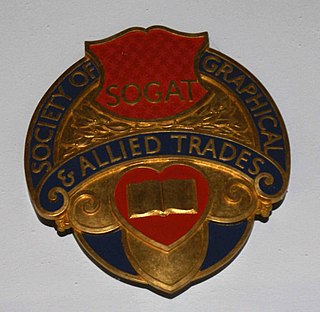Related Research Articles
In British politics, an affiliated trade union is one that is linked to the Labour Party. The party was created by the trade unions and socialist societies in 1900 as the Labour Representation Committee and the unions have retained close institutional links with it.

The Society of Graphical and Allied Trades (SOGAT) was a British trade union in the printing industry.
Richard William Briginshaw, Baron Briginshaw was a British trade union leader and politician.
The National Union of General Workers (NUGW) was an early general union in the United Kingdom, the most important general union of its era.
The National Amalgamated Union of Labour (NAUL) was a general union in the United Kingdom.

The National Union of Boot and Shoe Operatives (NUBSO) was a trade union in the United Kingdom which existed between 1873 and 1971. It represented workers in the footwear industry.
The Printing Industry Employees' Union of Australia (PIEUA) was an Australian trade union which existed between 1915 and 1966. It represented a range of production and trades workers in the printing industry.
The National Amalgamated Union of Shop Assistants, Warehousemen and Clerks was a trade union representing retail workers in the United Kingdom.
The Amalgamated Textile Warehousemen's Association was a trade union representing workers in the textile industry in the United Kingdom, principally in Lancashire.
The General Council of the Trades Union Congress is an elected body which is responsible for carrying out the policies agreed at the annual British Trade Union Congresses (TUC).

The Amalgamated Society of Dyers, Finishers and Kindred Trades was a trade union representing dyers and workers in related jobs in the United Kingdom.
The National Union of Wallcoverings, Decorative and Allied Trades (NUWDAT) was an industrial union representing workers connected with the manufacture of wallpaper in the United Kingdom.

The Printing and Kindred Trades Federation (P&KTF) was a trade union federation in the United Kingdom.
The National Union of Printing and Paper Workers was a trade union representing workers in the printing industry in the United Kingdom.
Alfred Evans was a British trade union organiser.
The United Society of Engravers was a trade union representing engravers, principally in the cotton industry, but also in the paper printing industry, in the United Kingdom.
Thomas George Newland was a British trade union leader.
The Bookbinders and Machine Rulers' Consolidated Union (B&MRCU) was a trade union representing people involved in the manufacturing of books in the United Kingdom.
Henry R. King was a British trade union leader. He was a leading advocate for women's trade unionism who served for many years as treasurer of the London Trades Council.
The London Consolidated Lodge of Journeymen Bookbinders was a trade union representing bookbinders based in London.